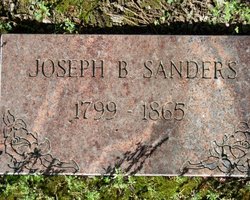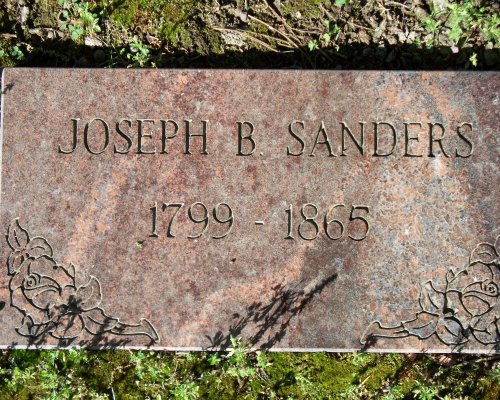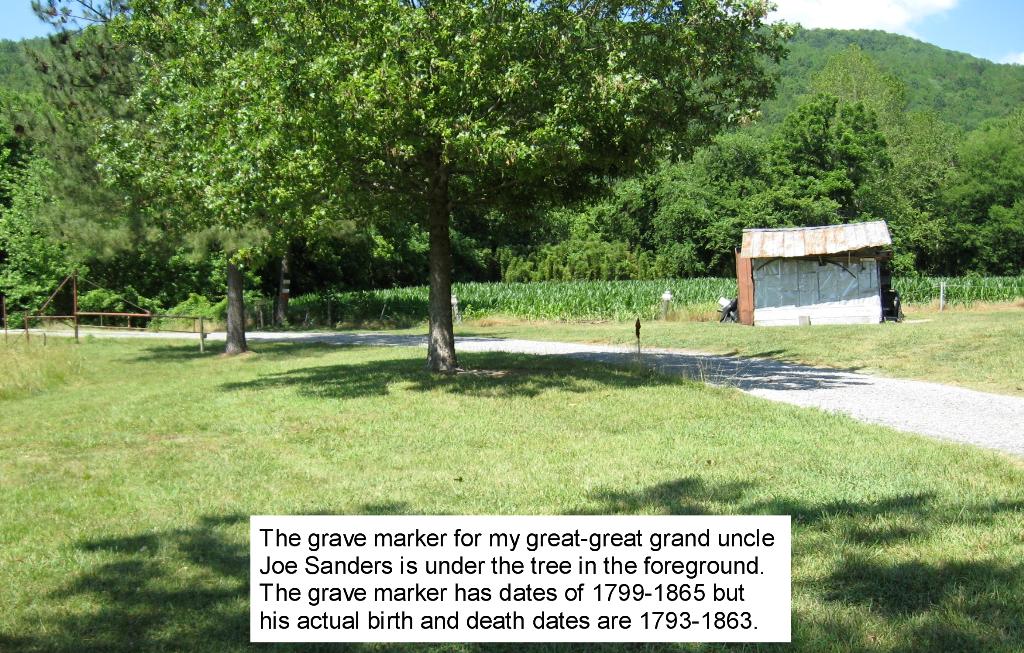He is my 4th Grand-Father.
~Dianne
Joseph Sanders was born in 1793, in Randolph County, North Carolina, the son of Joseph and Rebecca Sanders. The elder Joseph died in 1803. The younger Joseph married Martha Sanders on August 21, 1809 in Randolph County. Whether Martha was a cousin to Joseph is not known.
In the late 1820s, Joseph and Martha, their large family of children, and many of their relatives moved to Jackson County, Alabama. As the Cherokee and other Indian groups were pushed further west, the northeast Alabama region along the Tennessee River became a prime destination for white settlement. Joseph bought land in the area and farmed there the rest of his life.
During the late 1830s, Martha died, and Joseph began seeking a new wife. He re-married about 1838 to Deborah Saunders who was from Montgomery County, North Carolina. One of the descendants of Joseph's second marriage, Lottie Kingery Hoge, would later write, "I don't know how she first got acquainted with my Alabama grandfather, Mr. Joseph Sanders, but she went to Alabama and they were married. He was much older than her for he had been married before and had 12 children, most of them grown and married, probably at ages of 14-16. I don't know when they (Joseph and Deborah) were married but probably about 1838 for their oldest son was born about 1840. That was Uncle Henry." [quotation from this letter provided by Don Schaefer]
Joseph and Deborah had three children together before she died about 1854. Joseph married for the third time on November 11, 1860 to Mahala Harper of Jackson County. The 1860 census list Joseph as age 67 with personal property worth $1500 and real estate worth $1500. While he was not a wealthy man, these assets were enough to indicate his farm was prosperous by the standards of the time. Joseph Sanders, by 1860, was the acknowledged patriarch of the Jackson County Sanders. Nearly everyone called him "Uncle Joe," regardless of whether he was actually an uncle, cousin, granduncle, or some other relative.
When the Civil War arrived, the citizens of Jackson County were split. There were few slaves in Jackson County and many residents were subsistence farmers who had little regard for the large plantation owners. Nevertheless, there was still substantial support for the Confederacy, and those who refused to accept secession were regarded as traitors by those who supported the Rebel cause. Although too old to serve as a soldier, Joseph remained loyal to the Union, and his sons and some of his nephews joined the Union Army.
The conflicting loyalties in northeast Alabama created a very chaotic and lawless situation in which it is often difficult to determine the motivations of the people involved. Murders, shootings, and acts of violence were commonplace. "Uncle Joe" Sanders was killed in one of these incidents in 1863 while he was working in his field at his farm at Mud Creek.
The following letter by Louie Richard Davis of Texas was written to friends in Scottsboro, Alabama, July 24, 1974, and was published in Sanders Siftings, July 2000, p. 1:
"I know you have some information on the Sanders that was killed by bushwhackers. I have heard a story here in Texas passed down through generations (may have changed some). One of the Sanders, close relation to Phoebe was caught off guard while plowing in a field by bushwhackers. They took him and his horse to the top of a hill and made the Sanders dig a grave. Then the bushwhackers killed both man and horse and buried both in the grave with the legs of the horse sticking up out of the grave. This is some tale and may not be exactly true but is what I have heard."
There are several other variants of this story. One of Joe's descendants stated he got the following story from his grandmother who heard the story from her mother:
"The rebel neighbors hung him on a mulberry tree because they thought he was giving information to the Yankees. There were three of the rebels, one a neighbor by the name of Barbee - after killing him they left with a horse they were using as a pack mule to carry (I suppose) the things that they had taken. That evening, not long after the rebels had left, a group of Yankees came down out of the mountain and went after the rebels. They caught up with them near the foot of the mountain close to the old Moody Brick. The Yankees killed the horse and made the men dig a grave for it. When the grave was dug - they killed the men - put them in the hole and rolled the horse in on top of them." [Information from Robert Dean]
Although the preceding story is that Joseph was hanged, the Huntsville newspaper in 1863 stated that "an old man named Saunders" was shot in Jackson County because of his pro-Union actions. Joseph's descendant stated that Joe was not buried near the mulberry tree where he was hanged. Instead, he was buried some distance away near where an infant child of Joseph and Deborah had been buried earlier. There may very well be other family members who are buried nearby, but no other markers are present today.
Originally four cedar posts were erected to mark his grave. Later, in the early 1990s, someone erected a modern marker for Uncle Joe's grave. Unfortunately, the dates on the new tombstone are incorrect and his name is listed as Joseph B. Sanders, although there are no records that give him a middle name or initial. His real birth and death dates are 1793 and March 10, 1863.
The grave is located under a tree at the end of County Road 111 in Jackson County. Local people call this site "Dolberry Hollow." Today, one sees only a pastoral view of thriving fields of corn and mountain scenery. It's difficult to imagine the strife that engulfed the area at the time Uncle Joe Sanders died.
Also located across the road is the "Blowing Cave," which is something of a local tourist attraction. A strong breeze blows from the cave, hence the name by which it has been known since before the Civil War.
In her book, "Sanders and Bean Families: Past and Present," Virginia Retan has the following about the Blowing Cave:
"Mother Nature provided an air conditioner during the terribly hot season of summer, known as the Blowing Cave. The cave was named Blowing Cave because of the cool breeze that forever flowed from the entrance in the summer and the warm breeze which flowed in the cooler months. This cave was, and is today, quite an attraction.
"Inside the cave, there are many rooms. People have used the Blowing Cave many times for shelter from tornadoes and other storms. Unfortunately, many of the rooms have been washed away by great gushes of water which are known to come unexpectedly from the cave.
"Some people say that the end of the cave comes out in Winchester, Tennessee. Some have said that they have traveled all through the cave and it took them three or four days to reach the other side.
"Now (1986), many groups enjoy exploring the cave, with experienced guides, of course. Scouts enjoy staying overnight there, checking out the remaining rooms of the cave.
"The cave is now posted and people enter at their own risk. Young couples used to take walks there on Sunday afternoons; even now in 1986, it is said there is evidence of courtships of days long ago, in the names carved on trees or scraped in the rocks at the entrance of the cave."
Although the cave is no longer open to the public (as of 2008),one can still stand many feet away, however, and get a good view of the cave opening, and, sometimes even feel the breeze, just as Uncle Joe and his relatives probably used to do on hot summer days before the Civil War.
--Gary Sanders, February 2008
great-great grand nephew of Joe Sanders
He is my 4th Grand-Father.
~Dianne
Joseph Sanders was born in 1793, in Randolph County, North Carolina, the son of Joseph and Rebecca Sanders. The elder Joseph died in 1803. The younger Joseph married Martha Sanders on August 21, 1809 in Randolph County. Whether Martha was a cousin to Joseph is not known.
In the late 1820s, Joseph and Martha, their large family of children, and many of their relatives moved to Jackson County, Alabama. As the Cherokee and other Indian groups were pushed further west, the northeast Alabama region along the Tennessee River became a prime destination for white settlement. Joseph bought land in the area and farmed there the rest of his life.
During the late 1830s, Martha died, and Joseph began seeking a new wife. He re-married about 1838 to Deborah Saunders who was from Montgomery County, North Carolina. One of the descendants of Joseph's second marriage, Lottie Kingery Hoge, would later write, "I don't know how she first got acquainted with my Alabama grandfather, Mr. Joseph Sanders, but she went to Alabama and they were married. He was much older than her for he had been married before and had 12 children, most of them grown and married, probably at ages of 14-16. I don't know when they (Joseph and Deborah) were married but probably about 1838 for their oldest son was born about 1840. That was Uncle Henry." [quotation from this letter provided by Don Schaefer]
Joseph and Deborah had three children together before she died about 1854. Joseph married for the third time on November 11, 1860 to Mahala Harper of Jackson County. The 1860 census list Joseph as age 67 with personal property worth $1500 and real estate worth $1500. While he was not a wealthy man, these assets were enough to indicate his farm was prosperous by the standards of the time. Joseph Sanders, by 1860, was the acknowledged patriarch of the Jackson County Sanders. Nearly everyone called him "Uncle Joe," regardless of whether he was actually an uncle, cousin, granduncle, or some other relative.
When the Civil War arrived, the citizens of Jackson County were split. There were few slaves in Jackson County and many residents were subsistence farmers who had little regard for the large plantation owners. Nevertheless, there was still substantial support for the Confederacy, and those who refused to accept secession were regarded as traitors by those who supported the Rebel cause. Although too old to serve as a soldier, Joseph remained loyal to the Union, and his sons and some of his nephews joined the Union Army.
The conflicting loyalties in northeast Alabama created a very chaotic and lawless situation in which it is often difficult to determine the motivations of the people involved. Murders, shootings, and acts of violence were commonplace. "Uncle Joe" Sanders was killed in one of these incidents in 1863 while he was working in his field at his farm at Mud Creek.
The following letter by Louie Richard Davis of Texas was written to friends in Scottsboro, Alabama, July 24, 1974, and was published in Sanders Siftings, July 2000, p. 1:
"I know you have some information on the Sanders that was killed by bushwhackers. I have heard a story here in Texas passed down through generations (may have changed some). One of the Sanders, close relation to Phoebe was caught off guard while plowing in a field by bushwhackers. They took him and his horse to the top of a hill and made the Sanders dig a grave. Then the bushwhackers killed both man and horse and buried both in the grave with the legs of the horse sticking up out of the grave. This is some tale and may not be exactly true but is what I have heard."
There are several other variants of this story. One of Joe's descendants stated he got the following story from his grandmother who heard the story from her mother:
"The rebel neighbors hung him on a mulberry tree because they thought he was giving information to the Yankees. There were three of the rebels, one a neighbor by the name of Barbee - after killing him they left with a horse they were using as a pack mule to carry (I suppose) the things that they had taken. That evening, not long after the rebels had left, a group of Yankees came down out of the mountain and went after the rebels. They caught up with them near the foot of the mountain close to the old Moody Brick. The Yankees killed the horse and made the men dig a grave for it. When the grave was dug - they killed the men - put them in the hole and rolled the horse in on top of them." [Information from Robert Dean]
Although the preceding story is that Joseph was hanged, the Huntsville newspaper in 1863 stated that "an old man named Saunders" was shot in Jackson County because of his pro-Union actions. Joseph's descendant stated that Joe was not buried near the mulberry tree where he was hanged. Instead, he was buried some distance away near where an infant child of Joseph and Deborah had been buried earlier. There may very well be other family members who are buried nearby, but no other markers are present today.
Originally four cedar posts were erected to mark his grave. Later, in the early 1990s, someone erected a modern marker for Uncle Joe's grave. Unfortunately, the dates on the new tombstone are incorrect and his name is listed as Joseph B. Sanders, although there are no records that give him a middle name or initial. His real birth and death dates are 1793 and March 10, 1863.
The grave is located under a tree at the end of County Road 111 in Jackson County. Local people call this site "Dolberry Hollow." Today, one sees only a pastoral view of thriving fields of corn and mountain scenery. It's difficult to imagine the strife that engulfed the area at the time Uncle Joe Sanders died.
Also located across the road is the "Blowing Cave," which is something of a local tourist attraction. A strong breeze blows from the cave, hence the name by which it has been known since before the Civil War.
In her book, "Sanders and Bean Families: Past and Present," Virginia Retan has the following about the Blowing Cave:
"Mother Nature provided an air conditioner during the terribly hot season of summer, known as the Blowing Cave. The cave was named Blowing Cave because of the cool breeze that forever flowed from the entrance in the summer and the warm breeze which flowed in the cooler months. This cave was, and is today, quite an attraction.
"Inside the cave, there are many rooms. People have used the Blowing Cave many times for shelter from tornadoes and other storms. Unfortunately, many of the rooms have been washed away by great gushes of water which are known to come unexpectedly from the cave.
"Some people say that the end of the cave comes out in Winchester, Tennessee. Some have said that they have traveled all through the cave and it took them three or four days to reach the other side.
"Now (1986), many groups enjoy exploring the cave, with experienced guides, of course. Scouts enjoy staying overnight there, checking out the remaining rooms of the cave.
"The cave is now posted and people enter at their own risk. Young couples used to take walks there on Sunday afternoons; even now in 1986, it is said there is evidence of courtships of days long ago, in the names carved on trees or scraped in the rocks at the entrance of the cave."
Although the cave is no longer open to the public (as of 2008),one can still stand many feet away, however, and get a good view of the cave opening, and, sometimes even feel the breeze, just as Uncle Joe and his relatives probably used to do on hot summer days before the Civil War.
--Gary Sanders, February 2008
great-great grand nephew of Joe Sanders






